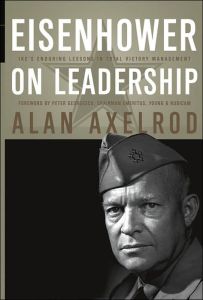Join getAbstract to access the summary!

Join getAbstract to access the summary!
Alan Axelrod
Eisenhower on Leadership
Ike's Enduring Lessons in Total Victory Management
Jossey-Bass, 2006
What's inside?
U.S. President and General Dwight D. Eisenhower can teach you a lot about courageous, ethical leadership.
Recommendation
U.S. Army General Dwight David Eisenhower was the Supreme Commander of Allied forces in Europe during World War II. A brilliant strategist and an expert in logistics and organization, Eisenhower planned Operation Overlord, the successful 1944 invasion of Europe by way of the English Channel. D-Day remains history’s largest amphibious assault. In 1945, at the height of his military power, Eisenhower commanded more than four million troops from five different nations. He functioned as a manager of managers, directing all military activities in Europe. He was, in effect, the “CEO” of the war in Europe – and indeed, in a letter to Lord Louis Mountbatten of Britain, Eisenhower described his role of Supreme Commander as that of a “chairman of a board.” How he successfully planned and coordinated the Allied military effort is the subject of this fascinating military history cum informative treatise on management by business writer Alan Axelrod. Axelrod applies Ike’s down-to-earth thinking to the management of organizations, people or important projects in a series of lessons – 232 of them, to be exact. This long, unprioritized list is more than most readers can really absorb. Nevertheless, getAbstract suggests that managers who want to learn what inspired, successful leadership truly means study this history of the European conflict from the uniquely informed perspective of Eisenhower, the ultimate insider.
Summary
About the Author
Alan Axelrod, a former English professor, is the author of two bestsellers, Patton on Leadership and Elizabeth I, CEO, and more than 60 other books on management and business topics.


























Comment on this summary